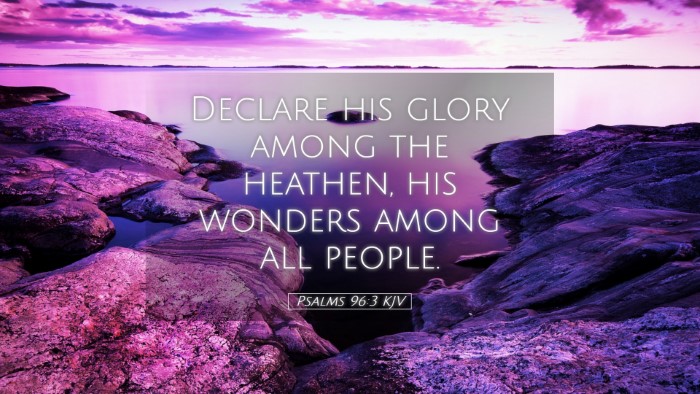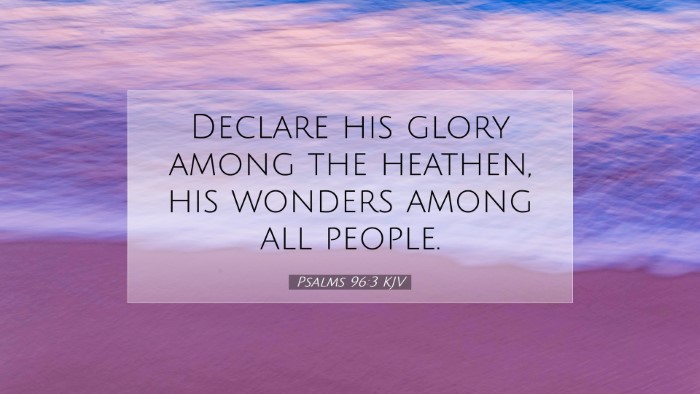Psalms 96:3 - A Commentary
Text of Psalms 96:3: "Declare his glory among the nations, his marvelous works among all the peoples!"
Introduction
The book of Psalms is a rich anthology of Hebrew poetry and prayers, which expresses a range of human emotions from despair to exuberant praise. Psalm 96 stands out as a call to worship, celebrating God's sovereignty and inviting all creation to recognize His majesty. Verse 3 serves as a pivotal directive in this worshipful psalm, urging believers to proclaim the glory of God. This commentary synthesizes insights from public domain sources, enhancing our understanding of Psalm 96:3.
The Call to Proclaim
"Declare his glory among the nations" - The phrase underscores the universal scope of God’s glory. According to Matthew Henry, this declaration is not merely a personal or local acknowledgment but an imperative to share God's magnificence with the whole world. Believers are called to be messengers of God's splendor, transcending boundaries of ethnicity, culture, and geography.
Albert Barnes further emphasizes this call to evangelism. He notes that the psalmist envisions an active engagement with the nations, suggesting that an authentic experience of God's glory compels believers to share that experience. The sentiment echoes the Great Commission found in Matthew 28:19, where Jesus commands His followers to make disciples of all nations.
The Nature of God's Glory
"his marvelous works" - The reference to God's marvelous works speaks to His actions in creation and salvation history. Adam Clarke notes that these works include both the natural wonders of the world and the miraculous events of biblical history, such as the deliverance of Israel from Egypt and the resurrection of Christ.
This verse serves as a reminder for pastors and leaders that God's glory is not unseen but manifested through His creations and deeds. The "marvelous works" are meant to be shared engagingly, offering various aspects as testimonies to God's character and activity. The nature of God's glory can be reflected in His justice, mercy, love, and power—each aspect inviting mankind to respond with awe and reverence.
Implications for Believers
The cosmic dimension of Psalms 96:3 necessitates a holistic approach to worship and evangelism. Matthew Henry argues that our lives should embody this proclamation, serving as living testimonies of God's glory. Every believer becomes a vessel through which God's glory can be declared through works and words.
- Worship: Worship should be vibrant and inclusive. Unlike the tabernacle worship, which was limited to the Israelites, the psalm promotes a worship that draws in nations, suggesting a dynamic expression suitable for diverse cultures.
- Mission: The call to declare God’s glory is intimately linked with mission work. Albert Barnes stresses that Christians must not only live out their faith but also actively share it, anchoring their activities in the marvels of God’s work in their own lives.
- Discipleship: The communal aspect of glorifying God encourages believers to nurture one another through teaching and testimony, thereby fostering a deeper knowledge of God's works and character.
Connecting with Creation
"among all the peoples" - This phrase emphasizes inclusivity in declaring God’s praise. Adam Clarke suggests that the psalm cannot be seen as merely a song for Israel but as a universal anthem that recognizes God as sovereign over all peoples. The psalmist beckons believers to acknowledge and celebrate God’s universal lordship, breaking barriers that often divide humanity.
As students of theology, it is vital to comprehend that the sharing of the gospel is not limited to the spoken word but encompasses all of creation. The natural world itself declares God’s glory, as noted in Romans 1:20. This holistic understanding encourages believers to advocate for stewardship of creation, showcasing God’s artistry in the world around them.
Conclusion
Psalm 96:3 encapsulates a profound call to believers, emphasizing the importance of declaring God’s glory and marvelous works across the earth. The synthesis of insights from various public domain commentaries provides a deeper understanding applicable to modern-day discipleship, evangelism, and worship.
For pastors and church leaders, this verse serves as a reminder that the glory of God must be declared—not only through liturgical practices but also through intentional outreach and engagement with diverse communities. Scholars and students of the Scriptures are encouraged to explore the implications of this call, reflecting on how they can effectively communicate the enormity of God's glory in both word and action.
In a world in desperate need of hope and redemption, the charge to "declare his glory among the nations" resounds with urgency. May this psalm ignite a passion for witness and worship, fostering a community not only knowledgeable in Scripture but also active in proclaiming the marvels of God’s work among all peoples.


